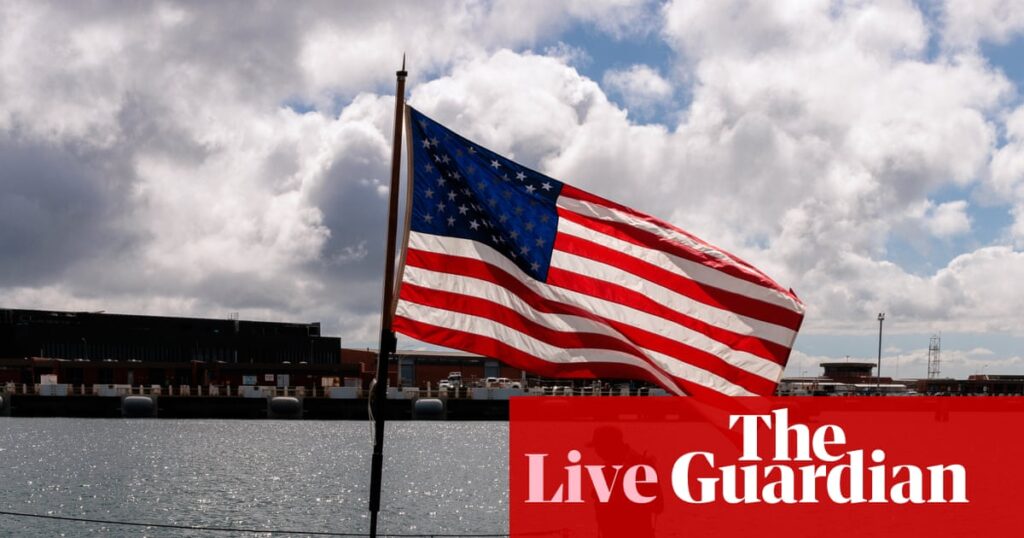Former Pentagon official urges Australia not to abandon Aukus pact

Ben Doherty
A former senior Pentagon official has urged the US not to abandon the Aukus pact, saying that would make the US “less capable” across the Pacific, but said Australia should give Washington more “concrete” commitments on how it would deploy its nuclear submarines in the event of war in the region.
US thinktank the Centre for Strategic and International Studies (CSIS), has published the report, written by Abraham Denmark (an Aukus adviser to former US defence secretary Lloyd Austin) and Charles Edel (CSIS’s Australia chair) as Australian defence minister Richard Marles arrives in Washington DC for a series of meetings with Trump administration officials.
The CSIS report argues Aukus is a “strategic imperative” for all three nations involved – the US, the UK and Australia – but the deal is at a “critical juncture”.
Aukus is currently being reviewed by a senior Trump administration Pentagon official, Elbridge Colby, an avowed Aukus sceptic.
Pillar One of Aukus will provide Australia with conventionally armed, nuclear-powered submarines, while Pillar Two will focus on cooperation between the three militaries in developing new technologies, particularly in AI, quantum technologies and undersea, hypersonic and electronic warfare capabilities.
Key events

Tom McIlroy
Recognition of Palestinian statehood follows international consultation, PM says
Anthony Albanese has told Labor MPs the world is “engaging” to back a two-state solution in the Middle East, weeks out from the United Nations general assembly getting under way.
In a meeting of Labor’s caucus at Parliament House, the prime minister said Australia had made a decision in the national interest to recognise Palestinian statehood at next month’s meeting in New York, following consultation with international partners.
He told the closed door meeting he had consulted widely before announcing the recognition decision, including discussing it with Israel’s prime minister, Benjamin Netanyahu.
Albanese is seeking to build momentum for Palestinian statehood by coordinating with countries including the UK, Canada and France, but the announcement has sparked a backlash from Netanyahu’s administration.

Caitlin Cassidy
Organisations welcome higher education code requiring mandatory response and training to prevent sexual violence
Leading violence against women prevention organisation, Our Watch, has welcomed Monday’s passing of a national higher education code to respond to gender-based violence in the sector.
The legislation will require Australian universities and university-operated student accommodation providers to legally respond to sexual violence and take action to prevent it for the first time, including mandatory training and reporting requirements.
The CEO of Our Watch, Patty Kinnersly, said the new regulations demonstrated a crucial shift in placing the onus on providers at the stage of prevention, pointing to the last National Student Safety Survey (NSSS), undertaken in 2021, which found 1 in 6 students experienced sexual harassment.
The national code makes it clear: prevention is not optional, it’s a core responsibility for every higher education and student accommodation provider.
The women’s officer at The Council of Australian Postgraduate Associations, Vaness Yap, said there was “no doubt” the legislation was a significant step to protect students, while adding the next NSSS would be “essential” to understanding whether the crisis had worsened and understand additional safeguards needed:
We are excited to see renewed government momentum in the higher education sector … We hope that this momentum translates to action on the remaining Universities Accord recommendations.

Sarah Basford Canales
Greens meet to discuss aged care, environment law and Israel’s ‘double tap’ bombing of Gaza hospital
The Greens party room met this morning to discuss the week’s main agendas, including aged care and environment law reform as well as Israel’s latest strike on a hospital in Gaza.
From their newly constructed party room, the minor party discussed Labor’s proposal this morning to put forward a bill to overhaul the federal environmental protection regime by the end of the year.
The Greens say they will look at the proposal but warned the federal government needed to remain the “ultimate decision maker” over the state governments. They expect debate over the new bill will happen early in 2026.
The Greens are also going to push the Albanese government to apply the same sanctions regime against Israel as it does against Russia in response to its “double tap” strike overnight at Nasser hospital in Gaza, which killed at least 20 people including five journalists.
The party will hold a press conference shortly.

Josh Butler
Albanese admits changes to NDIS and pension ‘difficult’ decisions
Returning to the government party room, the prime minister, Anthony Albanese, admitted changes to the NDIS and pension deeming rates were “difficult” decisions from the government, but that Labor believed they were in the national interest.
Albanese in the party room meeting praised Jim Chalmers and other ministers for their efforts around the economic roundtable, including 40 meetings with individual stakeholders before the major summit. The PM also chipped the Coalition for its public division over the net zero goal, claiming (as he has publicly) “you only reject net zero if you think climate change isn’t real”.
“We will always be focused on the Australian people, never on ourselves,” Albanese told the room, saying “that could involve difficult national interest decisions”.
The PM referred to changes to the NDIS, announced last week to set up a new scheme that would cater for some children with autism, and the decision to shift the deeming rate for pensions, which means pensioners will be able to earn less income from financial assets before having their government payments affected.
Trump vows fresh tariffs on countries pursuing digital services taxes against US tech giants

Tom McIlroy
US president Donald Trump says he will impose tough new tariffs and chip export restrictions on countries pursuing digital services taxes against big American technology companies.
Federal Labor will be closely watching the comments, made in the past few minutes on social media.
“As the President of the United States, I will stand up to countries that attack our incredible American tech companies,” Trump wrote.
Digital Taxes, Digital Services Legislation, and Digital Markets Regulations are all designed to harm, or discriminate against, American Technology.
They also, outrageously, give a complete pass to China’s largest Tech Companies.
I put all Countries with Digital Taxes, Legislation, Rules, or Regulations, on notice that unless these discriminatory actions are removed, I, as President of the United States, will impose substantial additional Tariffs on that Country’s Exports to the U.S.A., and institute Export restrictions on our Highly Protected Technology and Chips.
He said the US and big tech companies were not “the “piggy bank” nor the “doormat” of the world any longer.
Show respect to America and our amazing Tech Companies or, consider the consequences!

Ben Doherty
Continuing from our last post …
If Aukus was successfully implemented, it would “strengthen its closest allies, send a powerful deterrent message to Beijing, and help stabilise the region,” the CSIS report argues.
However, if it was scrapped, Denmark and Edel argue, the US would:
Become less capable in the Indo-Pacific, its defence posture and diplomatic presence would become less deeply embedded, its international credibility would be dramatically undercut, deterrence would be undermined, and propaganda from Beijing and Moscow declaring the unreliability of American commitments would gain significant credibility”.
One of the key issues of Aukus Pillar One centres on the “sovereignty” Australia would hold over any nuclear submarines.
The CSIS report argues the two countries should undertake “contingency planning” to establish how, and under what conditions, Australia’s nuclear-powered submarines would be deployed in a conflict in the region.
Planning, in which military strategists from the United States and Australia would jointly undergo a comprehensive process of strategising and organising military operations to achieve specific objectives, would provide US officials with more concrete reassurances that submarines sold to Australia would not disappear if and when needed.
Former Pentagon official urges Australia not to abandon Aukus pact

Ben Doherty
A former senior Pentagon official has urged the US not to abandon the Aukus pact, saying that would make the US “less capable” across the Pacific, but said Australia should give Washington more “concrete” commitments on how it would deploy its nuclear submarines in the event of war in the region.
US thinktank the Centre for Strategic and International Studies (CSIS), has published the report, written by Abraham Denmark (an Aukus adviser to former US defence secretary Lloyd Austin) and Charles Edel (CSIS’s Australia chair) as Australian defence minister Richard Marles arrives in Washington DC for a series of meetings with Trump administration officials.
The CSIS report argues Aukus is a “strategic imperative” for all three nations involved – the US, the UK and Australia – but the deal is at a “critical juncture”.
Aukus is currently being reviewed by a senior Trump administration Pentagon official, Elbridge Colby, an avowed Aukus sceptic.
Pillar One of Aukus will provide Australia with conventionally armed, nuclear-powered submarines, while Pillar Two will focus on cooperation between the three militaries in developing new technologies, particularly in AI, quantum technologies and undersea, hypersonic and electronic warfare capabilities.
Marles yet to lock in meeting with Hegseth

Tom McIlroy
Richard Marles to meet JD Vance and Marco Rubio in Washington DC this week
Richard Marles, the defence minister, will meet the US vice-president, JD Vance, and the secretary of state, Marco Rubio, during his trip to Washington this week.
Stephen Miller, a close adviser to the US president, Donald Trump, will also meet Marles.
Marles is still yet to confirm a meeting with US defence secretary, Pete Hegseth, where the Aukus submarine agreement is due to be discussed.
Marles has met with defence industry companies including Austal USA, Northrop Grumman, L3Harris, General Dynamics, Boeing Defense and Anduril.
Labor wants the respective industrial bases of the US and Australia to become increasingly seamless.

Andrew Messenger
Queensland’s victims commissioner quits after damning report
Queensland’s victims commissioner has stepped down, after government released a damning report into an organisation she previously managed.
Beck O’Connor was appointed in the role last year to represent victims of crime and make recommendations to government.
On Tuesday, the minister for victim support, Laura Gerber, announced in parliament that she had resigned, effective 23 September.
In her time in the role, Ms O’Connor has raised awareness of victims’ rights and ensured victims of crime have had a priority voice at the table. The Crisafulli government is committed to putting victims of crime first.
The office of the victims’ commissioner is critical to identifying systemic issues relating to victims and promoting and advocating for the rights of victims.
Acting arrangements will be in place to ensure continuity of important work from the office of the victims’ commissioner until a new appointment is made.
O’Connor was CEO of helpline service DVConnect during a period when the government alleges, thousands of phone calls went unanswered.
Send your political questions to the Back to Back Barries podcast
In the wake of parliament resuming this week, do you have any burning political questions?
Back to Back Barries is Guardian Australia’s political analysis podcast. Each week veteran journalist Barrie Cassidy joins former Liberal adviser and pollster Tony Barry to pull apart the strategies behind the politics.
And they want to hear from you. Send your politics questions to backtobackbarries@theguardian.com and they’ll pick some to answer on this week’s episode, out this Saturday.
Israel’s attack on Gaza hospital ‘horrific’, Wong says
Israel’s strike on a hospital overnight is “horrific”, says foreign affairs minister Penny Wong.
The strikes killed at least 20 Palestinians including five journalists, according to health officials.
Speaking to Channel 7, Wong said the Netanyahu government must agree to a ceasefire.
What we’ve seen overnight with the attack on a hospital is horrific, and what we would say to prime minister Netanyahu is you should heed the call of the world and agree to a ceasefire.
You should take the advice of your own military and agree to a ceasefire.
Cabinet minister Murray Watt told the ABC this morning the strikes were an “outrage” and a “breach of international law”.

Tom McIlroy
Greens urge Labor to come clean on fossil fuel donations
The Greens want Labor to explain how much the party has banked in political donations from fossil fuel companies ahead of the government announcing Australia’s 2035 emissions reduction targets, due between now and September.
The Greens leader, Larissa Waters, said in the most recent data made public, Labor had received about $800,000 from resources companies, including in cash, subscriptions and tickets to party events.
But donations data for the 2024–25 financial year, including contributions ahead of the 3 May federal election, won’t be made public until next February. That is due to the reporting lag under election law in Australia.
Waters says we should know the total amount received before the new target is announced.
If Labor wants to show genuine climate leadership, it must open its books now, not bury this information until 2026, otherwise Australians will rightly question who is pulling the strings.
When coal and gas corporations pour big money into politics, they’re effectively given a pen to write our climate and environmental laws. That’s not democracy, that’s capture.
Real climate action should be for people and [the] planet, not private profits.
Business group urges Labor to commit to ambitious 75% emissions target
350 businesses are piling pressure on the government to go hard with their 2035 emissions reduction target, signing an open letter calling on Labor to commit to a 75% target.
The Business for 75 group includes Fortescue, Atlassian, Canva and Ikea. Their open letter comes with new analysis from Deloitte, showing a 75% target could bring with it an increase in Australia’s GDP by $370bn by 2035.
Labor is waiting for the Climate Change Authority to advise on a 2035 target. Last year, the CCA consulted industry and climate groups on a potential target in the range of 65 to 75% emissions reduction on 2005 levels.
The new Deloitte analysis says a 75% target would bring forward investment of up to an additional $20bn a year to 2035 compared to a 65% target, and would increase Australia’s competitiveness overseas. Deloitte Access Economics’ lead partner, Pradeep Philip, says:
Getting these foundations right with a 75% target can drive, in today’s dollars, $190bn more exports by mid-century.
Liberal senator condemns ‘unacceptable’ targeting of Indian Australians ahead of anti-immigration protest
A Liberal senator has spoken out against a planned anti-immigration protest this Sunday.
Paul Scarr, a Queensland senator, addressed parliament last night, condemning the March for Australia rallies that will take place across the country. There are nine planned protests.
The flyers accuse Labor and the Liberals of being “complicit” in mass migration, and singles out an increase in migration from India. Scarr told parliament he stands in solidarity with the Indian community in Australia:
I am compelled to rise in this place at the earliest opportunity to call it out and to condemn it and say that the language and references to Australians of Indian heritage is unacceptable. It is outrageous … it seeks to divide Australians at a time when we need to unite.

Luca Ittimani
Fewer children attending childcare provider G8, but company posts $22m profit
Childcare giant G8 Education has seen profits pick up despite fewer children attending its centres, which it has blamed on cost-of-living pressures rather than child safety issues across the sector.
Fewer families took up childcare spots across the company’s 399 centres in the first half of 2025 than the same period in 2024, the centre said. Children also attended slightly less frequently, which combined saw revenue slip to $465.4m but also brought down costs, meaning profits soared to $22.5m.
But customer satisfaction was the more important measure, if the comments from G8’s chief executive, Pejman Okhovat, were anything to go by. He started his remarks addressing the sector’s child abuse crisis that has seen governments rush to tighten regulation, saying in a statement:
We recognise that safeguarding children is not just a regulatory obligation, it is an ethical and social licence imperative.
Okhovat said satisfaction and employee retention were on the rise while family inquiries for places had remained stable compared to 2024. He told investors some families were delaying starting their children at a centre early in the year.
Family satisfaction slipped slightly in April but rose again by May. G8’s annual report, released this morning, read:
[The] impact of [the] Victorian incident on occupancy is localised to the impacted centres thus far, and we are not seeing wider trends across the state or the network.
The chief executive also highlighted that 93.7% of G8’s centres had been rated as “exceeding” or “meeting” the national quality standard, which is above average. But that implies 25 centres have not achieved either rating, with a further two yet to be rated.

